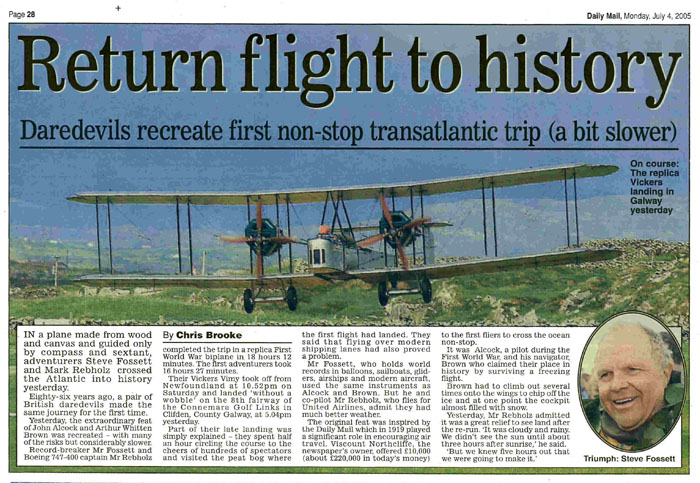June 4, 2005 issue of Daily Mail - England
Return flight to history
Daredevils recreate first non-stop transatlantic trip (a bit slower)
By Chris Brooke
Monday, June 4, 2005 Page 28
In a plane made from wood and canvas and guided only by compass and
sextant, adventurers Steve Fossett and Mark Rebholz crossed the Atlantic
into history yesterday.
Eighty-six years ago, a pair of British daredevils made the same journey for the first time.
Yesterday, the extraordinary feat of John Alcock and ARthur Whitten-Brown was recreated - with many of the risks but considerably slower.
Record-breaker Mr. Fossett and Boeing 747-400 captain Mr. Rebholz completed the trip in a replica First World War biplane in 18 hours 12 minutes. The first adventurers took 16 hours 27 minutes.
Their Vickers Vimy took off from Newfoundland at 10:52 p.m. on Saturday and landed "without a wobble" on the 8th fairway of the Connemara Gold LInks in Clifden, County Galway, at 5:04 p.m. yesterday.
Part of their late landing was simply explained -they spent half an hour circling the course to the cheers of hundreds of spectators and visited the peat bog where the first flight had landed. They said that flying over modern shipping lanes had also proved a problem.
Mr. Fossett, who holds world records in balloons, sailboats, gliders, airships and modern aircraft, used the same instruments as Alcock and Brown. But he and co-pilot Mr. Rebholz, who flies for United Airlines, admit they had much better weather.
The original feat was inspired by the Daily Mail which in 1919 play a significant role in encouraging air travel. Viscount Northcliffe, the newspaper's owner, offered £10,000 (about £220,000 in today's money) to the first fliers to cross the ocean non-stop.
It was Alcock, a pilot during the First World War, and his navigator, Brown who claimed their place in history by surviving a freezing flight.
Brown had to climb out several times onto the wings to chip off the ice and at one point the cockpit almost filled with snow.
Yesterday, Mr. Rebholz admitted it was a great relief to see land after the re-run. 'It was cloudy and rainy. We didn't see the sun until about three hours after sunrise,' he said.
'But we knew five hours out that we were going to make it.'
